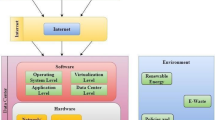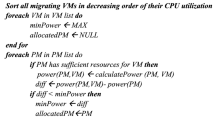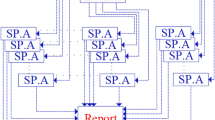Abstract
One of the major challenges in the high performance computing (HPC) clusters is intelligent power management to improve energy efficiency. The key contribution of the presented work is the modeling of a Power Aware Job Scheduler (PAJS) for HPC clusters, such that the: (a) threshold voltage is adjusted judiciously to achieve energy efficiency and (b) response time is minimized by scaling the supply voltage. The PAJS considers the symbiotic relationship between power and performance and caters the optimization of the both, simultaneously. The key novelty in our work is utilization of the dynamic threshold-voltage scaling (DTVS) for the reduction of cumulative power utilized by each node in the cluster. Moreover, to enhance the performance of the resource scheduling strategies in this work, independent tasks within a job are scheduled to most suitable computing nodes (CNs). This paper analyzes and compares eight scheduling techniques in terms of energy consumption and makespan. Primarily, the most suitable dynamic voltage scaling (DVS) level adhering to the deadline is identified for each of the CNs by the scheduling heuristics. Afterwards, the DTVS is employed to scale down the static, as well as dynamic power by regulating the supply and bias voltages. Finally, the per node threshold scaling is used attain power saving. Our simulation results affirm that the proposed methodology significantly reduces the energy consumption using the DTVS.












Similar content being viewed by others
References
Abbas, A., Ali, M., Fayyaz, A., Ghosh, A., Kalra, A., Khan, S.U., Khan, M.U.S., Menezes, T.D., Pattanayak, S., Sanyal, A., Usman, S.: A survey on energy-efficient methodologies and architectures of network-on-chip. Comput. Electr. Eng. doi:10.1016/j.compeleceng.2014.07.012
Ahmad, I., Ranka, S., Khan, S.U.: Using game theory for scheduling tasks on multi-core processors for simultaneous optimization of performance and energy. In: 22nd IEEE International parallel and distributed processing symposium, pp. 1–6 (2008)
Alfonso, C.D., Caballer, M., Avarruiz, F., Hernandez, V.: An energy management system for cluster infrastructures. J. Comput. Electr. Eng. 39(8), 2579–2590 (2013)
Ali, S., Siegel, H.J., Maheswaran, M., Hensgen, D., Ali, S.: Task execution time modeling for heterogeneous computing systems. In: IEEE 9th heterogeneous computing workshop, pp. 185–199 (2000)
Ali, S., Siegel, H.J., Maheswaran, M., Hensgen, D., Ali, S.: Representing task and machine heterogeneities for heterogeneous computing systems. Tamkang J. Sci. Eng. 3(3), 195–207 (2000)
Aziz, M.A., Khan, S.U., Loukopoulos, T., Bouvry, P., Li, H., Li, J.: An overview of achieving energy efficiency in on-chip networks. Int. J. Commun. Netw Distrib. Syst. 5(4), 444–458 (2010)
Beloglazov, A., Abawaj, J., Buyya, R.: Energy aware resource allocation heuristics for efficient management of data centers for cloud computing. Futur Gener. Comput. Syst. 28(5), 755–768 (2012)
Chaparro-Baqueero, G.A., Zhou, Q., Liu, C., Tang, J., Liu, S.: Power-efficient schemes via workload characterization on the Intel’s single chip cloud computer. In: IEEE parallel and distributed processing symposium workshops and Ph.D. forum (IPDPSW), pp. 999–1006 (2012)
Al-Daud, H., Al-Azzonib, I., Down, D.G.: Power aware linear programming based scheduling for heterogeneous computer clusters. In: Future generation computer system, vol. 24, 5th edn, pp. 745–754, May 2012. [Special section: energy efficiency in large scale distributed system]
Diaz, C.O., Guzek, M., Pecero, J.E., Bouvry, P., Khan, S.U.: Scalable and energy-efficient scheduling techniques for large-scale systems. In: International conference on computer and information technology (CIT ‘11), pp. 641–647 (2011)
Huang, S., Feng, W.: Energy efficient cluster computing via accurate workload characterization. In proceeding of the 2009 9\(^{th}\) IEEE/ACM international symposium on cluster computing and the grid. CCGRID, IEEE S (2009)
Andersson, J.: A survey of multiobjective optimization in engineering design. Technical report, Department of Mechanical Engineering, Linköping University, Linköping, Sweden (2000)
Khan S.U., Ardil, C.: A game theoretical energy efficient resource allocation technique for Large distributed computing systems. In: International conference on parallel and distributed processing, techniques and applications (PDPTA), pp. 48–54 (2009)
Khan, S.U., Ardil, C.: On the joint optimization of performance and power consumption in data centers. In: International conference on distributed, high-performance and grid computing, pp. 660–666 (2009)
Khan, S.U., Min-Allah, N.: A goal programming based energy efficient resource allocation in data centers. J. Supercomput. 61(3), 502–519 (2012)
Kliazovich, D., Arzo, S.T., Granelli, F., Bouvry, P., Khan, S.U.: Accounting for load variation in energy efficient data centers. In: IEEE international conference on communications (ICC), pp. 1154–1159 (2013)
Kolodziej, J., Khan, S.U., Wang, L., Byrski, A., Min-Allah, N., Madani, S.A.: Hierarichal genetic based grid scheduling with energy optimization. J. Clust. Comput. 16(3), 591–609 (2013)
Kolodziej, J., Khan, S.U., Wang, L., Kisiel-Dorohinicki, M., Madani, S.A., Niewiadomska-Szynkiewicz, E., Zomaya, A.Y., Xu, C.-Z.: Security, energy, and performance-aware resource allocation mechanisms for computational grids. Futur Gener. Comput. Syst. 31, 77–92 (2014)
Krioukov, A., Goebel, C., Alspaugh, S., Chen, Y., Culler, D.E., Katz, R.H.: Integrating renewable energy using data analytics systems: challenges and opportunities. Bull. IEEE Comput. Soc. Tech. Comm. 34(1), 3–11 (2011)
Lang, W., Harizopoulos, S., Patel, J.M., Shah, M.A., Tsirogiannis, D.: Towards energy-efficient database cluster design. Proc. VLDB Endow. (PVLDB) 5(11), 1684–1695 (2012)
Lang, W., Patel, J.M.: Energy management for map reduce cluster. Proc. VLDB 3(1–2), 129–139 (2010)
Lindberg, P., Leingang, J., Lysaker, D., Khan, S.U., Li, J.: Comparison and analysis of eight scheduling heuristics for the optimization of energy consumption and makespan in large-scale distributed systems. J. Supercomput. 59(1), 323–360 (2010)
Lindberg, P., Leingang, J., Lysaker, D., Bilal, K., Khan, S.U., Bouvry, P., Ghani, N., Min-Allah, N., Li, J.: Comparison and analysis of greedy energy-efficient scheduling algorithms for computational grids. In: Zomaya, A.Y., Lee, Y.-C. (eds.) Energy aware distributed computing systems. Wiley, Hoboken (2012). ISBN 978-0-470-90875-4, Chapter 7
Maiuri, O.V., Moore, W.R.: Implications of voltage and dimension scaling on CMOS testing: the multidimensional testing paradigm. In: 16th IEEE symposium on VLSI test (1998)
Mehta, N., Amrutur, B.: Dynamic supply and threshold voltage scaling for CMOS digital circuits using in-situ power monitor. IEEE Trans. VLSI Syst. 20(5), 892–901 (2012)
Min-Allah, N., Hussain, H., Khan, S.U., Zomaya, A.Y.: Power efficient rate monotonic scheduling for multi-core systems. J. Parallel Distrib. Comput. 72(1), 48–57 (2012)
Shuja, J., Madani, S.A., Bilal, K., Hayat, K., Khan, S.U., Sarwar, S.: Energy efficient data centers. Computing 94(12), 973–994 (2012)
Sha, S., Zhou, J., Liu, C., Quan, G.: Power and energy analysis on Intel single-chip cloud computer system. In: Proceedings of IEEE South Easton, pp. 1–6 (2012)
Usman, S., Khan, S.U., Khan, S.: A comparative study of voltage/frequency scaling in NOC. 2013. In: IEEE International conference on electro/information technology (2013)
Valentini, G.L., Lassonde, W., Khan, S.U., Min-Allah, N., Madani, S.A., Li, J., Zhang, L., Wang, L., Ghani, N., Kolodziej, J., Li, H., Zomaya, A.Y., Xu, C.-Z., Balaji, P., Vishnu, A., Pinel, F., Pecero, J.E., Kliazovich, D., Bouvry, P.: An overview of energy efficiency techniques in cluster computing systems. Clust. Comput. 16(1), 3–15 (2011)
Wang, L., Khan, S.U., Chen, D., Kołodziej, J., Ranjan, R., C.Z., Xu, Zomaya, A.: Energy aware parallel task scheduling in a cluster. Futur. Gener. Comput. Syst. 29(7), 1661–1670 (2013)
Zong, Z., Qin, X., Ruan, X., Bellam, K., Nijim, M., Alghamdi, M.: Energy-efficient scheduling for parallel applications running on heterogeneous clusters. In: International conference on parallel processing (ICPP 2007), pp. 19–26 (2007)
Acknowledgments
The authors would like to thank Saif-ur-Rehman and Mazhar Ali for their valuable reviews, suggestions, and comments.
Author information
Authors and Affiliations
Corresponding author
Rights and permissions
About this article
Cite this article
Bilal, K., Fayyaz, A., Khan, S.U. et al. Power-aware resource allocation in computer clusters using dynamic threshold voltage scaling and dynamic voltage scaling: comparison and analysis. Cluster Comput 18, 865–888 (2015). https://doi.org/10.1007/s10586-015-0437-9
Received:
Revised:
Accepted:
Published:
Issue Date:
DOI: https://doi.org/10.1007/s10586-015-0437-9




